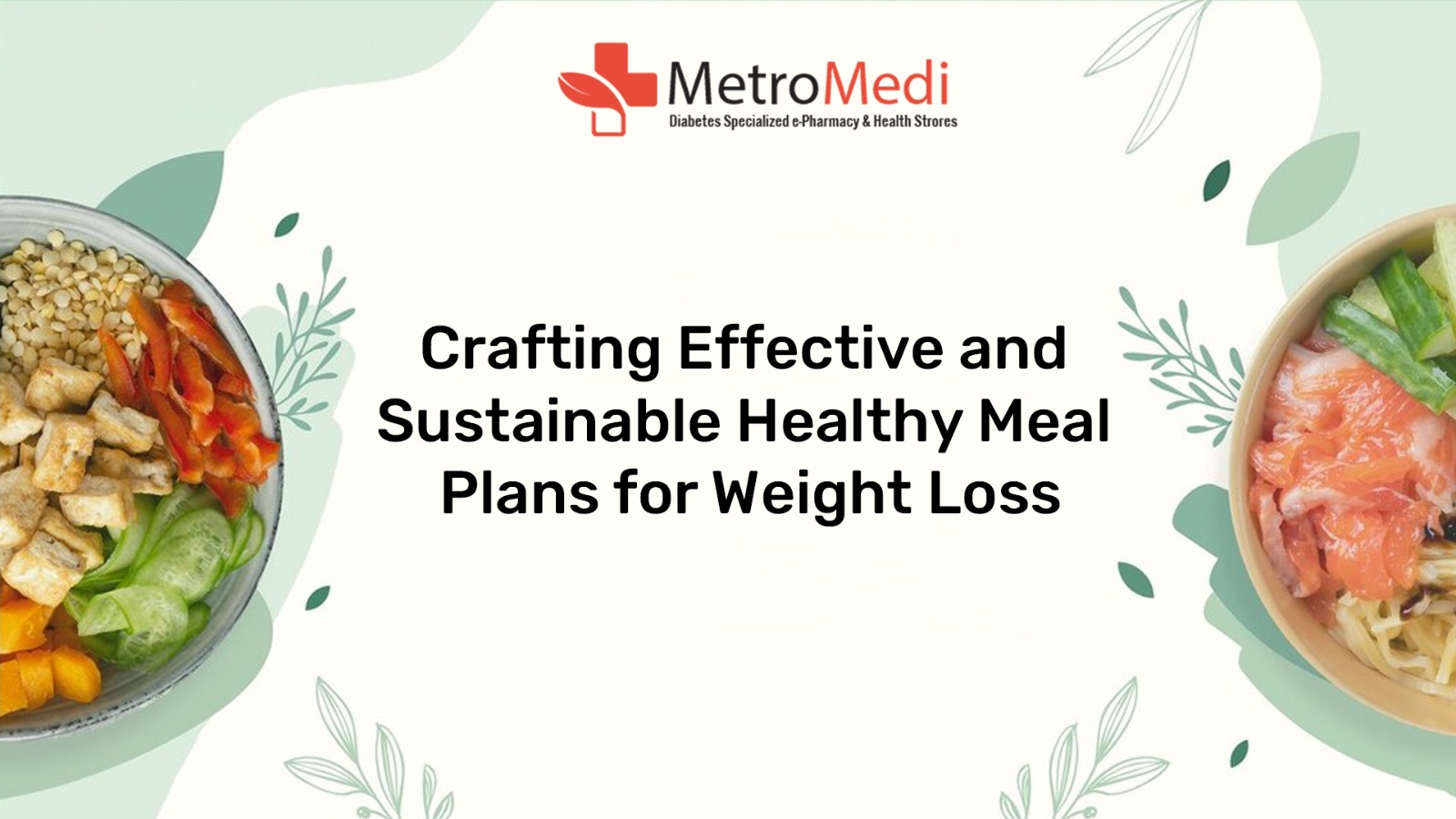Introduction : Healthy meal plans for weight loss
In a world where information on weight loss is abundant, finding a healthy meal plans for weight loss that suits your lifestyle and promotes sustainable weight loss can be challenging. Fad diets may promise quick results, but they often lack the essential nutrients needed for long-term success. This blog aims to guide you through the process of creating a healthy meal plan tailored for weight loss that not only sheds pounds but also fosters overall well-being.

Understanding the Basics of Healthy Meal Plans for Weight Loss
Before diving into the specifics of a healthy meal plan, it’s crucial to understand the basic principles of weight loss. At its core, weight loss is a result of consuming fewer calories than your body expends. However, the quality of those calories is equally important. Opting for nutrient-dense foods ensures that your body receives the necessary vitamins, minerals, and macronutrients while maintaining a calorie deficit.
Building Blocks of a Healthy Meal Plan
- Balanced Macronutrients: A well-rounded meal plan includes a balance of macronutrients – carbohydrates, proteins, and fats. Each macronutrient plays a vital role in supporting your body’s functions, and finding the right balance is key to sustained weight loss.
- Carbohydrates: Focus on complex carbohydrates like whole grains, legumes, and vegetables. These provide a steady release of energy, keeping you fuller for longer.
- Proteins: Include lean protein sources such as poultry, fish, tofu, beans, and low-fat dairy. Protein is essential for muscle repair and growth, and it helps to keep you satisfied between meals.
- Fats: Incorporate healthy fats from sources like avocados, nuts, seeds, and olive oil. These fats are crucial for brain health and hormone regulation.
- Portion Control: Controlling portion sizes is crucial for weight loss. Even nutrient-dense foods can contribute to weight gain if consumed in excess. Use measuring tools or the “plate method” – dedicating half your plate to vegetables, a quarter to lean proteins, and the remaining quarter to whole grains.
- Fiber-Rich Foods: Foods high in fiber, such as fruits, vegetables, and whole grains, not only aid in digestion but also contribute to a feeling of fullness. This can prevent overeating and snacking between meals.
- Hydration: Staying hydrated is often overlooked in weight loss plans. Water not only supports bodily functions but can also help control hunger. Before reaching for a snack, try drinking a glass of water to ensure you’re not mistaking thirst for hunger.
Sample Meal Plan -Healthy Meal Plans for Weight Loss
Now that we’ve covered the foundational elements of a healthy meal plan, let’s create a sample plan for a day:
Breakfast:
- Scrambled eggs with spinach and tomatoes
- Whole-grain toast
- Fresh fruit (e.g., berries or an apple)
Mid-Morning Snack:
- Greek yogurt with a handful of almonds
Lunch:
- Grilled chicken or tofu salad with mixed greens, cherry tomatoes, cucumber, and a vinaigrette dressing
- Quinoa or brown rice on the side
Afternoon Snack:
- Carrot and cucumber sticks with hummus
Dinner:
- Baked salmon or a plant-based protein source (e.g., lentils or chickpeas)
- Steamed broccoli, asparagus, and a small sweet potato
Evening Snack (if needed):
- A small serving of mixed berries or a piece of dark chocolate
Tips for Success
- Meal Prepping: Plan and prepare your meals in advance to avoid making unhealthy food choices due to time constraints or hunger. Having nutritious meals readily available reduces the likelihood of opting for convenient but less nutritious options.
- Mindful Eating: Pay attention to your body’s hunger and fullness cues. Eat slowly and savor each bite. This helps prevent overeating and promotes a healthier relationship with food.
- Regular Physical Activity: While a healthy meal plan is a crucial component of weight loss, incorporating regular physical activity enhances the effectiveness of your efforts. Find activities you enjoy to make exercise a sustainable part of your lifestyle.
- Seek Professional Guidance: If you have specific dietary needs or health concerns, consider consulting a registered dietitian or nutritionist. They can provide personalized advice based on your individual requirements.
Conclusion
Embarking on a journey towards weight loss requires a holistic approach that prioritizes overall health and sustainability. A healthy meal plan is a fundamental aspect of this approach, providing the body with the nutrients it needs while promoting a calorie deficit. By focusing on balanced macronutrients, portion control, fiber-rich foods, and hydration, you can create a meal plan that supports your weight loss goals in a sustainable and enjoyable way. Remember, small, consistent changes lead to long-term success, and adopting a healthy lifestyle is the key to achieving and maintaining your desired weight.
